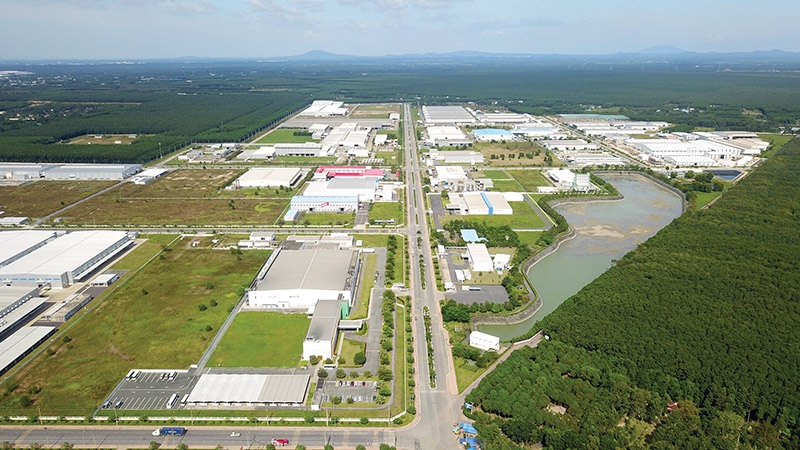Space expands for capital inflows from overseas
 |
| Long Duc Industrial Park is of multi-million-dollar scale, Photo: Sojitz Vietnam |
Japanese-backed Sojitz Corporation is planning to increase its investment portfolio with an upcoming project to develop an additional industrial park (IP) in the southern province of Dong Nai. An MoU was inked last week between Sojitz and its partners.
Although a representative of Sojitz did not disclose the specific capital for the project, Tran Thi Thu Huong, senior investment expert for Sojitz and deputy general director of Long Duc IP in Dong Nai, told VIR, “This project’s capital scale is larger than the $250 million IP project that Sojitz, DEEP C Industrial Zones, and Bamboo Capital Group are co-operating on.”
Having been operating in Vietnam for years, Sojitz is involved in a wide range of businesses in Vietnam, which span fertiliser production, feed production, flour milling, food wholesale, prepared food production, convenience store operations, and cold chain logistics.
Vietnam will continue to be one of the most attractive investment destinations for Japanese groups, especially after last November’s visit to Japan in which Vietnamese PM Pham Minh Chinh oversaw the signing of 25 major cooperation agreements worth up to $12 billion - much of which is set to be disbursed this year, according to the Ministry of Planning and Investment (MPI). The two countries are preparing for the 50th anniversary of diplomatic relations in 2023.
During the visit in November, the two prime ministers consented to further facilitate business collaborations between Japanese and Vietnamese companies as well as improve the investment environment for companies through cooperation in such areas as digital transformation, diversification of the production base, and development of supporting industries towards resilient global supply chains, including to both countries, which are main keys for economic revitalisation.
The next major trip for PM Chinh and a Vietnamese high-level delegation is to attend the ASEAN-US Special Summit at the invitation of President Joe Biden next week. The Vietnamese leader is expected to meet with many large-scale American companies and investors wishing to come to Vietnam for investment opportunities.
The MPI reported that in the first four months of this year, the registered investment capital from Japan and the United States into Vietnam hit $747.5 million and $169.4 million, respectively, contributing to Vietnam’s foreign direct investment (FDI) picture showing signals of recovery.
Specifically, Vietnam’s total newly-registered and added FDI inflows, in addition to stake acquisitions and paid-in capital, stood at as much as $10.8 billion. This figure covered $5.29 billion added to current projects, almost twice as high as a year ago in value.
Overseas investors also poured $1.83 billion into 1,026 share purchase deals, up 74.5 per cent compared to the figure a year ago in value.
Meanwhile, the newly-registered capital was $3.7 billion, a sharp decrease of 56.3 per cent in value. Explaining the reason why the newly-registered capital has yet to regain its increasing momentum, Nguyen Dinh Nam, CEO of IPA Vietnam, said, “Vietnam only resumed international flights in March, so it is too soon to see the impact of this policy on FDI attraction.”
In addition, some countries’ strict pandemic policies, such as China, is also a factor holding back the growth momentum of newly-registered capital because they contribute an important part to the whole country’s foreign capital inflow, according to Nam. Statistics published by the MPI’s Foreign Investment Agency showed that in the first four months of this year, China is the fourth-largest investor in Vietnam with the total registered investment capital of $1.07 billion.
In the long term, new investments have the foundation for a brighter picture. Savills Vietnam is working with investors to help them look for either new investment destinations or new partners. Localities are also improving connections and calling on foreign investors to pour money into them. For example, Quang Tri People’s Committee, BB Group, and Quantum Group signed a cooperation agreement on April 25 to develop a natural gas and port complex worth $5.5 billion.
What the stars mean:
★ Poor ★ ★ Promising ★★★ Good ★★★★ Very good ★★★★★ Exceptional
Related Contents
Latest News
More News
- SK Innovation-led consortium wins $2.3 billion LNG project in Nghe An (February 25, 2026 | 07:56)
- THACO opens $70 million manufacturing complex in Danang (February 25, 2026 | 07:54)
- Phu Quoc International Airport expansion approved to meet rising demand (February 24, 2026 | 10:00)
- Bac Giang International Logistics Centre faces land clearance barrier (February 24, 2026 | 08:00)
- Bright prospects abound in European investment (February 19, 2026 | 20:27)
- Internal strengths attest to commitment to progress (February 19, 2026 | 20:13)
- Vietnam, New Zealand seek level-up in ties (February 19, 2026 | 18:06)
- Untapped potential in relations with Indonesia (February 19, 2026 | 17:56)
- German strengths match Vietnamese aspirations (February 19, 2026 | 17:40)
- Kim Long Motor and AOJ Suzhou enter strategic partnership (February 16, 2026 | 13:27)

 Tag:
Tag:




















 Mobile Version
Mobile Version